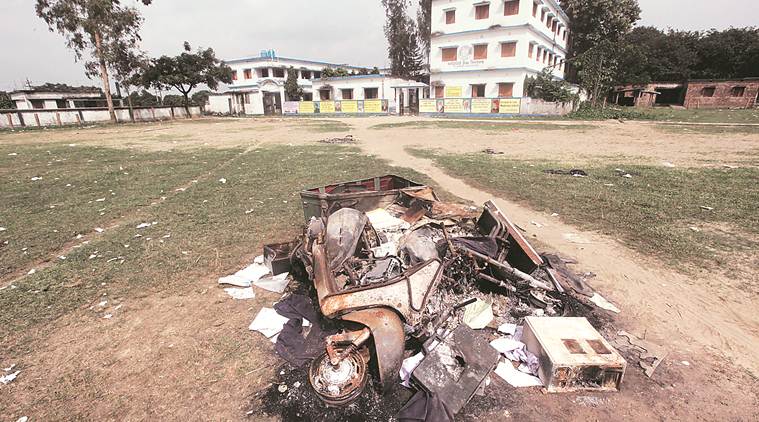 Daribhit High School in West Bengal’s Islampur has been closed since the September 20 clash. (Express Photo by Subham Dutta)
Daribhit High School in West Bengal’s Islampur has been closed since the September 20 clash. (Express Photo by Subham Dutta)
Hundreds of kilometres from the Daribhit High School in Islampur, Urdu teacher Md Sanaullah Rehmani and Sanskrit teacher Touranga Mullick, whose appointments led to protests and clashes in which two former students were killed on September 20, say they are worried for their future, but won’t go back to work.
On September 20, the day they were to join work, protests broke out at the Islampur school. Villagers and students, angry that they had got an Urdu and Sanskrit teacher while they had been demanding teachers for science and other subjects, allegedly ransacked the school and attacked the teachers.
As police fired rubber bullets and lobbed tear gas shells to disperse the mob, the protesters, many among them allegedly outsiders, pelted stones and lobbed crude bombs. Two former students of the school, Rajesh Sarkar, 19, and Tapas Burman, 21, were killed in the clashes.
“I still wake up at night thinking about that day,” says Rehmani, the 29-year-old Urdu teacher who is now back home in Kidderpore, Kolkata. “Imagine having to lock yourself up in a room for over an hour, while people try to break it open. Outside, we could hear blasts and cries… What is our fault? We were given appointment letters and we went there. It was my first day as a school teacher,” says Sanaullah, who gave tuitions in his neighbourhood before he was appointed to the Daribhit school on September 13.
“I haven’t told my parents yet. They will not be able to take the news. A lot depended on me and my new job. Is it wrong to become a teacher of Urdu?,” says Sanaullah, who has an MA in Urdu.
United in Sanaullah’s misery and fear is Touranga Mulick, the 32-year-old Sanskrit teacher. “The students manhandled us and forced us to write a resignation an hour after we officially joined the school,” he says from his home in Shalmari village in Coochbehar, where he lives with his parents, widow of his brother and their children.
Touranga’s father sells vegetables in the village market. “My family was hoping things will change for us with my government job,” says Touranga, who has a Master’s in Sanskrit from Jadavpur University.
Narrating the sequence of events of September 20, Sanaullah says both he and Tourango reached the school and officially joined at 1.10 pm. However, minutes later, students and others started to assemble.
“From the staff room, we saw hundreds of people outside the headmaster’s room. Some of them locked the main gate. A group of people and students came up to us and asked us to resign immediately. They manhandled us, threw papers and books at us and threatened that we would not be allowed to go out alive,” says Sanaullah.
“We were forced us to write that we do not want to teach in the school. After that, when we tried to leave, some of the students chased us. We locked ourselves in the clerk’s room. By then, people armed with lathis, rods and spades were trying to break open the door. I have never seen such a scene in my life,” says Tourango.
“Some of us started crying in panic,” says Sanaullah, adding that the chaos continued for over an hour, after which they were escorted into police cars amid stone pelting.
District Inspector of Schools Rabindranath Mondol, who was suspended on September 21 over the recent appointments, says, “I have been made a scapegoat. I followed all norms while carrying out the recruitments.”
Avijit Kundu, the headmaster, could not be contacted.